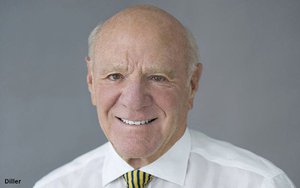
Is consolidation the only way for legacy TV
network-centric media companies to survive?
According to legendary TV and film executive Barry Diller, if this is what you believe, then you're thinking only about
egos -- entertainment egos.
For the most part, it comes down to the intersection of quality content and distribution.
Forget about wide access to distribution
-- aging linear and fast-moving streaming, as well as all other digital media access. Instead, turn the focus to producing great content for people to watch.
In a recent
interview at a Financial Times event, Diller cited concerns that companies have to stop believing they are in a leadership position.
advertisement
advertisement
“Hollywood no longer has
that hegemony,” he said, adding: “I don’t mean that the legacy companies are going to go out of business.”
Companies like Warner Bros.
Discovery and others might be going about it the wrong way.
“What has to do with it is, are you making programs -- movies and television -- products that
people want to see? If you’re better than your competitor in doing that, you’ll do OK.”
Diller adds that there are “so many different ways to get
your product to an audience” that “if you have a route to distribution, meaning you can get your product out, you’ll do okay.”
Still legacy media
just needs to be careful and not tread into those areas that big tech/digital media are in. More importantly, they may have to give up on what they assume is a leadership position.
“What is the definition of the leadership of Hollywood? The definition is that it has moved to technology companies, Netflix, Amazon and Apple. [They] are really the controllers
of what I think anybody would call the worldwide film and television business.”
For its part, Warner Bros. Discovery and others have been slowly gravitating toward
this -- to be what has been termed an “arms dealer” of sorts -- to become a supplier of high-quality/premium TV shows and films to digital media companies like Netflix, Amazon and
Apple.
While many legacy-media companies have made this subtle shift, they are not all in. They are still holding on to their efforts around distribution (linear TV
networks, streaming, local TV stations), with gradual financial and business transitions.
To his point, Diller believed he could be a major influencer as part of this
change.
Recently he had been considering a possible bid for Paramount Global, believing he had the better approach to right the direction for the company that had been going in the
wrong direction for some time.
Diller, a former senior TV and movie executive at Paramount, believed this could have been a return path to where he started in the
business.
“I thought of it as a duty rather than a desire. I thought I knew what to do with it.”
What were the specific
details of that path? He didn’t say. We get the hint ... it has nothing to do with “hegemony.”